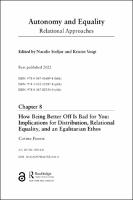Chapter 8 How Being Better Off Is Bad for You
Proposal review
Implications for Distribution, Relational Equality, and an Egalitarian Ethos
| dc.contributor.author | Fourie, Carina | |
| dc.date.accessioned | 2021-10-06T13:22:31Z | |
| dc.date.available | 2021-10-06T13:22:31Z | |
| dc.date.issued | 2022 | |
| dc.identifier.uri | https://library.oapen.org/handle/20.500.12657/50844 | |
| dc.description.abstract | In this chapter Fourie identifies and systematizes the impairments associated with having privilege, and evaluates their implications for theories of relational equality and distributive justice. Having certain social privileges, for example being a man in a patriarchal society, can also be damaging; in other words, there are “impairments of privilege”. Fourie delineates six kinds of impairments–epistemic, evaluative, emotional, health-related, affiliative, and moral. She then goes on to assess the implications of the impairments of privilege for two theories in political philosophy. Relational egalitarianism, she argues, has the theoretical resources to identify and address the problems associated with these impairments, whereas distributive egalitarianism does not. Furthermore, she argues that assessing the impairments of privilege through relational egalitarianism helps to characterize a society of equals: we must address the causes of functional impairments, express respect for the worse off by not normalizing the experiences of the privileged, and minimize competitive positionality. | en_US |
| dc.language | English | en_US |
| dc.subject.classification | thema EDItEUR::Q Philosophy and Religion::QD Philosophy | en_US |
| dc.subject.classification | thema EDItEUR::Q Philosophy and Religion::QD Philosophy::QDT Topics in philosophy::QDTS Social and political philosophy | en_US |
| dc.subject.other | philosophy, autonomy, feminist philosophy, political philosophy, ethics, equity, social philosophy | en_US |
| dc.title | Chapter 8 How Being Better Off Is Bad for You | en_US |
| dc.title.alternative | Implications for Distribution, Relational Equality, and an Egalitarian Ethos | en_US |
| dc.type | chapter | |
| oapen.identifier.doi | 10.4324/9780367823344-8 | en_US |
| oapen.relation.isPublishedBy | 7b3c7b10-5b1e-40b3-860e-c6dd5197f0bb | en_US |
| oapen.relation.isPartOfBook | 0eea1961-f566-49a2-8516-37f235e3d6e3 | en_US |
| oapen.relation.isFundedBy | 1286a4ee-cbd7-4645-97e6-bb22a666b4f4 | en_US |
| oapen.relation.isbn | 9780367416898 | en_US |
| oapen.relation.isbn | 9781032122878 | en_US |
| oapen.imprint | Routledge | en_US |
| oapen.pages | 27 | en_US |
| peerreview.anonymity | Single-anonymised | |
| peerreview.id | bc80075c-96cc-4740-a9f3-a234bc2598f1 | |
| peerreview.open.review | No | |
| peerreview.publish.responsibility | Publisher | |
| peerreview.review.stage | Pre-publication | |
| peerreview.review.type | Proposal | |
| peerreview.reviewer.type | Internal editor | |
| peerreview.reviewer.type | External peer reviewer | |
| peerreview.title | Proposal review | |
| oapen.review.comments | Taylor & Francis open access titles are reviewed as a minimum at proposal stage by at least two external peer reviewers and an internal editor (additional reviews may be sought and additional content reviewed as required). |

